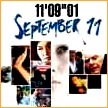
|
The other side of 9/11
The Black Day, as seen by 11 filmmakers from across the world
|
Arthur J Pais in Toronto
When Adama spots a man looking like Osama bin Laden in his impoverished village in Burkina Faso, West Africa, the boy immediately starts plotting to nab the man and win the $5 million reward offered by America.
Of course, Adama cannot do it alone. So he enlists his friends who arm themselves with knives, daggers, spears, a gun --- and a video camera.
When the man, oblivious to the plot and minding his own business, flies away, the kids scream, begging him to come back. Osama, we need you, they implore. They want to get rich, and more important, Adama's dying mother will get better medical treatment. One of the boys then suggests that they try to kidnap George Bush and ask for ransom.
Don't, warns another boy, he will bomb our country.
The 11-minute-long hilarious episode in the epic film 11'09"01 that opened on September 11 at the Toronto International Film Festival is among the most refreshing segments in the controversial film produced by the French firm Studio Canal. The segment was directed by Idrissa Quedraogo, one of the two African filmmakers featured in the film that opened to rave reviews at the recent Venice festival.
The thought-provoking and utterly compelling movie has not found a distributor in America as yet, perhaps because some of its segments are overtly critical of the United States. The filmmakers represent 11 countries and as many viewpoints.
Not surprisingly, it was the must-see film at the Toronto festival and more than 700 journalists and their friends waited in line for over 90 minutes to get into the two auditoriums that screened the movie for the media on September 10. Though hardly anyone walked out during the two-hour-long film, there was no applause at the end.
"I would have liked to applaud a few segments at least," said one critic. "But the film was too diffused to me and pulled me in various directions."
Several Americans sniggered at the idea proposed by a couple of filmmakers that America was also guilty of terrorist activities. "Since when have two wrongs started making one right?" asked one American. "You mean to say China and Russia haven't done far worse things than Americans? At least we went into Vietnam with honourable intentions, of wanting to make the world safe for democracy."
There were several other films at TIFF, including The Trial of Henry Kissinger, a documentary that was acutely critical of American foreign policy. But none drew as much interest and attention as 11'09"01.
The most anti-American statement in the film comes not from Egypt or Iran, but from Britain, from the celebrated leftist director Ken Loach. It is also about September 11, also a Tuesday, set three decades ago in Chile when the elected government of Socialist Premier Salvador Allende was overthrown at the behest of the American government.
The segment opens with a Chilean, who had fled his home country after being tortured by the new rulers, writing an open letter to the families of those who had perished in America in the 9/11 attacks. The letter poignantly recollects some of the significant incidents in Chile that paved the way for the military coup.
The Egyptian segment, directed by Youssef Chahine, engages in discussion about American foreign policy and the concomitant deaths in thousands in Vietnam, the Middle East, and other troubled regions.
Mira Nair's segment, charged with emotion, tells the true story of a missing young Pakistani Muslim being sought by the FBI as a possible terrorist. But months after 9/11, his family hears from the official that his remnants have been found. He had died trying to help the WTC victims.
But the most engaging segment of the film was directed by Iranian Samira Makhbalaf. Set in an Afghan refugee settlement, it shows a teacher trying to draw her young students into finding out what happened in New York on 9/11. A terrible thing has happened, she tells them, that could lead to World War III and atomic bombs being used. Do they know what it is about?
One of the students knows for sure: she has heard that two people fell into a newly dug well in the refugee settlement and both died. Not true, argues her friend. Two fell, but one survived. Another wants to whisper the news into the teacher's ears.
No, says the teacher, the entire class has to hear it. The child hesitates. Then she blurts out that her aunt was buried up to the neck and stoned in Afghanistan. When the teacher tries to tell them about tall towers and how they were destroyed, some of the children start discussing God.
God does not go about destroying towers, says a kid. He only takes the lives of people. And why does he do it, asks another kid, apparently confused. So that he can create new people, says her friend.